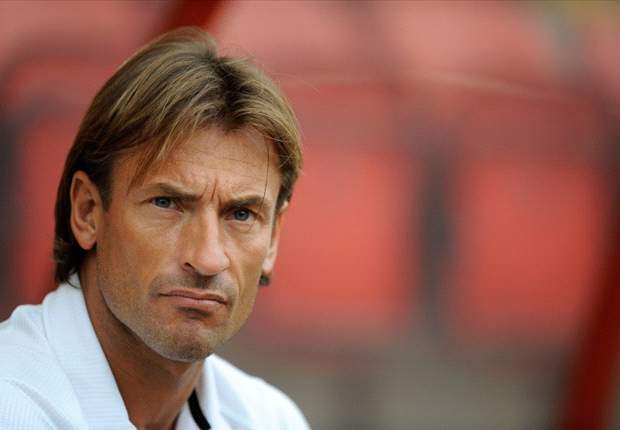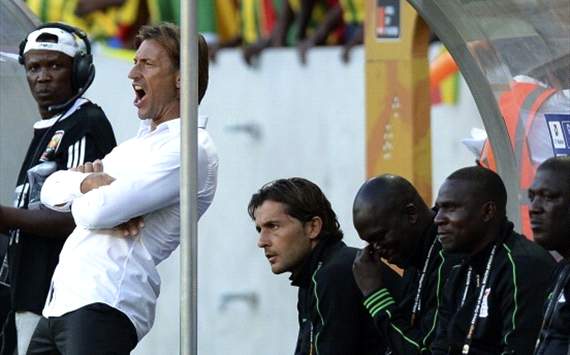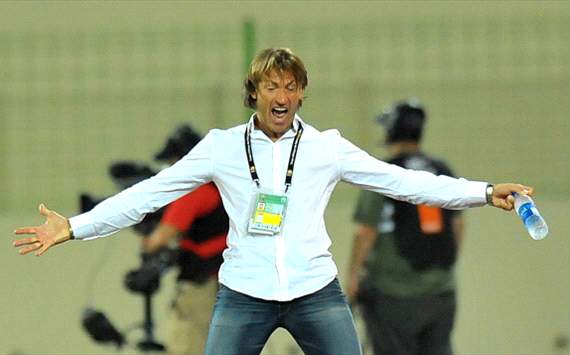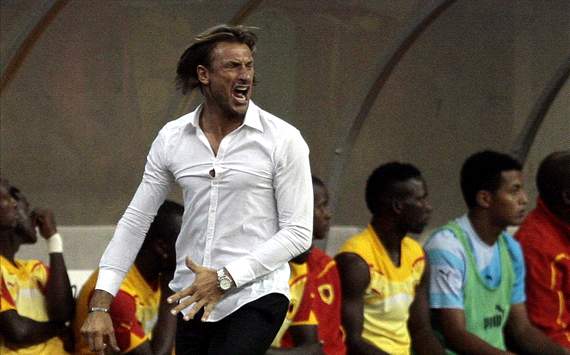
The French boss departs the Chipolopolo for
Sochaux after an unforgettable few years; the memories will never fade,
but does Renard leave with some regrets?
ANALYSISBy Ed Dove
One of my dearest friends is intrigued by African football almost exclusively because of Herve Renard.
The French manager left such an impression during the Africa Cup of Nations in 2012 that even she, previously oblivious of the continent’s sport, had her interest piqued. Perhaps it was the crisp white dress shirt draped over a faded pair of jeans; maybe it was the roaring charm or the Gallic shrug; possibly it was the tanned features and brooding masculinity…regardless, she was hooked.
After two years with Zambia, Renard has been released from his position—the Football Association allowing him to leave to take over the top job at Sochaux.

Renard | Ending his affiliation with Zambia
The Frenchman has emerged—over the last few years—as one of football’s most fascinating individuals. He is the latest in a long line
of eccentric, engaging, captivating characters to have travelled to
Africa hoping for a new direction in their careers. Renard, like Blagoje
Vidinic, Claude Le Roy and Bruno Metsu before him, certainly found it,
and leaves the continent as one of its most enduring coaches.The stand-out achievement, and the cornerstone upon which any of his future successes will be built, was the Chipolopolo’s Afcon triumph in early 2012.
Renard took an unfancied side, riddled with players who had never plied their trade away from Africa, or who had, but had returned to the continent unfulfilled, to an unlikely championship. The achievement in itself was superb; forging a team from a collection of underachievers, but the manner of the triumph, the nature of the spectacle, will ensure that neither Renard, nor his magical month in 2012, will ever be forgotten.
En route to victory, Zambia escaped from a potentially testing group, beating the hosts Equatorial Guinea and the highly-regarded Senegal, before dispatching Sudan in the Quarter-final.
In the last four, almost all of us expected their luck to run out.
Their opposition, Ghana, were, after all, one of the tournament’s favourites and boasted an exciting squad containing the likes of Asamoah Gyan, Andre Ayew and Kwadwo Asamoah. Perhaps the Black Stars’ draining extra time victory over Tunisia in the previous round took its toll, and certainly things could have been many shades of different had Kennedy Mweene’s strong hand not blocked Baby Jet’s penalty.
In the end, it didn’t matter, as Emmanuel Mayuka’s emphatic, dramatic late winner broke Ghanaian spirits and sent Zambia—40/1 before the tournament—into the final.

Meeting Triumph & Disaster
Here, they faced Cote d’Ivoire, the so-called Golden Generation,
Africa’s veteran superstars finally poised to claim the continental
honour that had so regularly slipped through their grasp.Once again they came up short, as the Chipolopolo held firm—demonstrating breathtaking reserves of spirit and togetherness to keep out their illustrious opposition, overcome the near-trauma of a late (missed) Didier Drogba penalty, and to hold their nerve after Rainford Kalaba’s own blunder in the shoot-out.
The euphoria, the ultimate euphoria, that accompanied Stoppila Sunzu’s final penalty was born from the unlikely nature of the victory, the strength of an Ivorian side that didn’t concede once during the tournament, and the sense of destiny, honouring the memory of the Zambian side lost in 1993 as their plane crashed off the coast of Libreville—the venue for the climactic contest.
It was, as the manager himself stated, “Written in the sky”.
Renard’s influence on the final games was hard to ignore. The way that the manager had drawn together and emboldened the various disparate aspects of his squad was particularly impressive, and his explosive passion particularly endearing—a world away from some of the staid responses we see from too many managers.
This approach was typified by the coach’s now infamous interaction with full-back Davies Nkausu. Having failed to follow Renard’s tactical instruction, and not responding to the manager’s anguished appeals, Nkausu received the full brunt of the boss’s frustrations, receiving a tidy slap across the face for his insubordinate behaviour!
Nkausu’s calm response went a long way to indicating the manager’s prowess; the respect he instilled in his team and the extent to which his ideas and approaches had found favour among his subjects.
It became clear very quickly that he was not, as Sulley Muntari had suggested, just a physical trainer.

Fire & Fury in Libreville
Perhaps, in hindsight, then would have been the ideal time to have
departed from the Zambian job and to have sought his fortunes elsewhere.
Renard, however, was convinced by the strength and talent within the
squad and appeared keen to both defend their Cup of Nations title in South Africa earlier this year and ensure a premier World Cup qualification for the country.His dream of taking the Chipolopolo to the World Cup faded as the side struggled to repeat their prior heroics against Ghana in the group stage of CAF Qualifying. At the Cup of Nations earlier in the year they were one of the major disappointments, not registering a victory and only scoring twice in three games.
While no one will ever be able to take the Afcon triumph away from Renard and his team, the subsequent disappointments have to represent a failure on his behalf—particularly the meek defence of their continental crown. The likes of Christopher Katongo, James Chamanga and Joseph Musonda may all have been increasing in age and declining in influence, but in figures such as the aforementioned Nkausu and Kalaba, as well as Isaac Chansa, he had some accomplished players arriving at their peak, not to mention a talented collection of youngsters in Stoppila Sunzu, Nathan Sinkala, Emmanuel Mbola and Emmanuel Mayuka.
Patrice Beaumelle, who is taking over the national team as interim manager, has a talented squad to work with, even if pride has been wounded following recent struggles.
Sochaux, on the other hand, will relish the prospect of Renard at the helm.
Struggling near the foot of Ligue 1, the Doubs-based club need a figurehead who can unite the squad, can maximize the potential of a team strung together on limited resources and develop the next generation of top flight players to emerge from Les Lionceaux’s fabled academy.
Renard, taking with him the experience of five years away from Europe, could be just the man. He can be that cult of personality around whom the club can rally and, as we have seen, he is more than capable of making ordinary players believe in the extra-ordinary.
Zimbabwean journalist Farayi Mungazi joked that Renard’s abdication would prompt “plenty of tears from ladies all around Zambia”. True as this may be, the Chipolopolo’s loss may well prove to be Montbeliard’s gain.
And clearly my friend needs to find a new direction for her passions. ------------------- goal.com
No comments:
Post a Comment